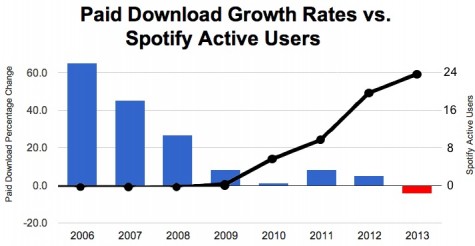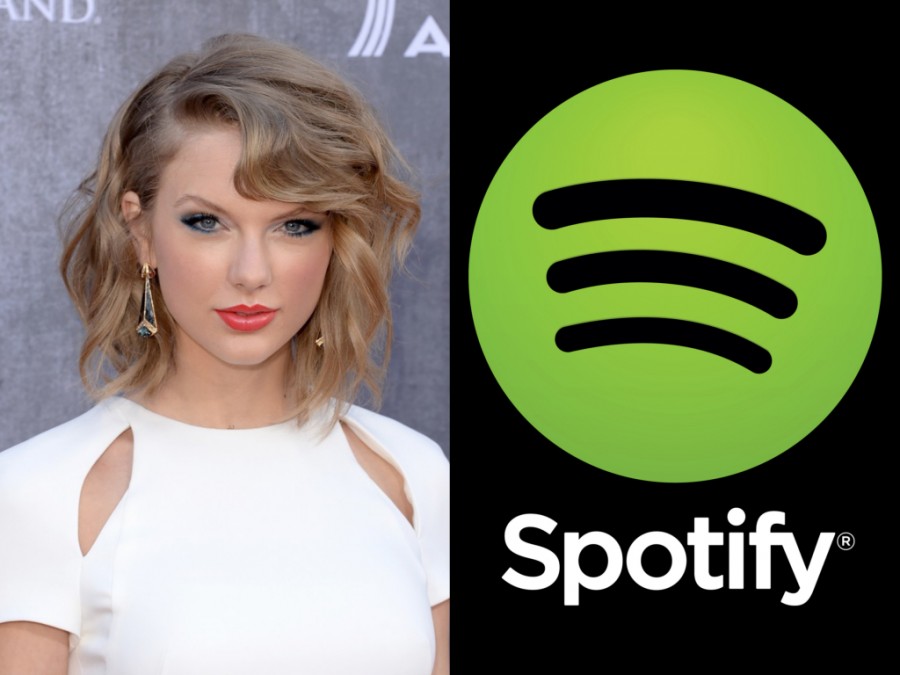Taylor Swift and Spotify: Why the Singer is Wrong About Streaming
Swift has taken a strong stance against the streaming giant.
December 1, 2014
This past July, The Wall Street Journal published an op-ed written by Taylor Swift, in which the singer-songwriter explained how the music industry is going to suffer as long as fans are able to access music for free. More recently, she’s worked towards advocating her cause, most notably by pulling her music from the popular music streaming service Spotify. She continued to argue her case publically in her acceptance speech at the American Music Awards, claiming that by buying music in albums, fans are appreciating music and respecting it the way it should be.
Before I begin, I have to say that I would describe myself as a fan of Taylor Swift’s music, and while I was never an obsessed fan, her biggest hits marked pivotal moments in my life.
Swift states in her editorial that she saw herself as one of the few remaining optimists in her field, and that “the music industry is not dying…it’s just coming alive.” Yet she precedes this claim by describing how, by putting their work on music sharing sites such as Spotify or Pandora, artists’ product, or ‘art’, as she repeatedly describes, is not valued or respected as it should be.
Now I don’t disagree that artists, as well as everyone involved in the process of producing music, need reciprocation for their work, but how hard is streaming really affecting that? While a side-by-side comparison of numbers would show that album sales bring significantly more revenue, I don’t think Swift is thinking in terms of the future, as she claims she is. While she periodically acknowledges in her piece that times are changing, she is wrapped around the idea that the only way for her field of work to continue to prosper is by continuing what is slowly proving to be the downfall of the industry.
Up until about the mid 2000s, if you wanted to listen to a single song, you had to buy the entire record, cassette, or CD, and you would most likely listen to that record over and over until you saved up enough to buy a new one. Our generation is exactly the opposite of that. We can listen to music at our own choosing, which gives us more room to test new waters, getting our feet wet in a variety of music genres that we might not normally explore. Companies like Spotify take this even further, allowing listeners to choose whatever songs they want without the commitment of having to buy them, the only price being the occasional commercials every couple songs.
What I believe that Swift fails to realize is that her industry is in fact growing. If it weren’t for YouTube, my middle school self certainly wouldn’t have memorized all the lyrics to “You Belong With Me”—not only because of the onscreen lyrics, but because I wasn’t about to spend $15 on an album of someone who I had only heard a few times on the radio. Without given the freedom to listen to her music at my own dispense, I never would have come to like her as much as I do today.

Another factor of this situation that just doesn’t seem right is why Swift is so hung up on the financial aspect. While it is perfectly fair for someone to expect proper compensation for their work, I do believe that artists, not limited to Swift, are reaping much more than they deserve. When in debate with Spotify, the amounts that Swift was wagering were in the hundred thousands—certainly nothing to scoff at for the average Joe, but not even a dent to someone with a net worth of almost $200 million. “My hope for the future, not just in the music industry, but in every young girl I meet…is that they all realize their worth and ask for it,” Swift writes. According to this logic, anyone who has a decent voice should not back down until they have steady income from album sales as well as revenue from sold-out stadium concerts, movie and television appearances, a perfume line, and endorsement deals with Diet Coke and Keds just to name a few.
Whether or not Swift needs it enough to be arguing, money is being made in the music sharing industry. Once again, Swift needs to look at where we’re headed instead of being hung up on going back to where we once were. If music streaming takes off to the degree that it is very well shaping up to, big corporations will see where the public interest lies, and plant their endorsements. I like to think of it the same way I do of apps on my phone. I’ll deal with the ads while I’m testing it out, and if it’s worth it, I’ll pay my $1.99. Ads or no ads, the developers are still making money. While Swift proceeds to keep her music away from the testing ground, I will continue to enjoy her songs via the two music videos from her recent album on YouTube—and I will spend every 30-second ad before the video appreciating the art that is about to grace my ears.
Disclaimer: The views and opinions shared in this article are those of the writer, and not Zephyrus as a whole.
